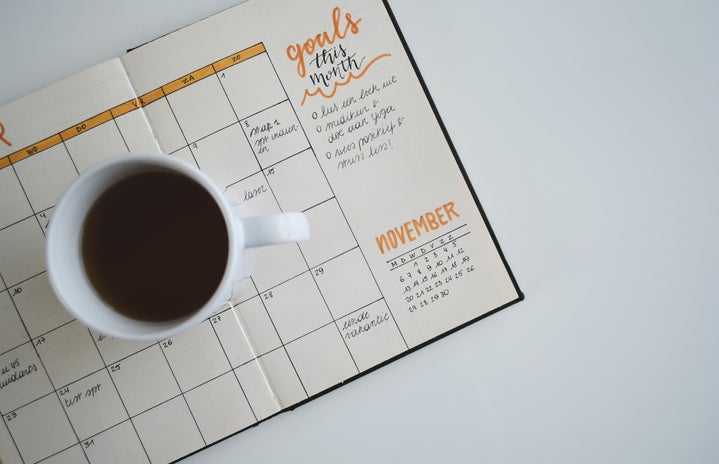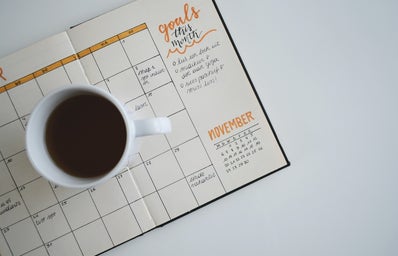In high school, I was known as the girl who never sat still. 12-hour days filled with extracurriculars, an after-school job, and mountains of homework were the norm. I spent my weekends with family, finishing the remainder of my work, spending time with my friends, and getting in my fix of Netflix, Spotify, and the latest book I was reading – not to mention catching up on the sleep lost during the week, when I slept about five hours a night. On Monday, I’d start all over again. I could be seen buzzing around or with a book open – even during lunch. Everyone knew if you called at one am I’d still be up, and I even drove with a car magnet that said “I run on caffeine.”
Despite being satisfied with my busy schedule, I’d regularly get chided by my friends, family, and teachers: “Lex, you’ve got to get more sleep!” “C’mon Lexi, managing all of those things can’t be good for you.” “You’re going to run yourself into the ground; you’re pushing yourself too hard!” Well, I can promise you that a lack of activity, too much sleep, and being confined to my house throughout the pandemic have actually proven to be detrimental for my mental health.
So, why did people feel the need to judge my workload? Well, open up any magazine, scroll through your social media feed, or turn on the TV, and you’ll see advice to “get more sleep,” “slow down,” or “take mental health days.” Suggestions to relax usually include baths, days on the couch, yoga, and spas. Busy schedules are often synonymous with stress and unhealthiness and don’t work for many people. However, being busy can also have its benefits, just like it did for me.
Rarely do you hear people talk about managing stress and anxiety by staying busy or through a combination of social, academic, and physical activity. As a result, people couldn’t believe my practices were working for me. The only people who understood were the ones who felt the same way – and they exist, I promise.
The reality of the situation is that you need to find a balance that works for you; like mine, it could be unique. I find soaking in baths uncomfortable, I’m not zen enough for yoga, and spending days on end in the house makes me anxious. Instead, my stress management includes a consistent routine, outings with friends, staying busy with schoolwork, the regular Gilmore Girls episode, and outdoor walks. This created a conventionally “busy” schedule. As quarantine progressed, I found that the balance I had created between staying busy, socializing, and maintaining structure was crashing down. Therefore, with the help of a close friend with similar habits, I started recording a podcast twice a week – providing forced socialization, a routine, and mental stimulation.
Current research shows that staying busy can actually be very beneficial for brain health. Maintaining an active schedule throughout your life and into later years can help to improve and retain cognition. Busyness improves memory and acuity. Similarly, correlations have been made between exercise and improved mental health; exercise reduces anxiety and improves mood through the release of endorphins.
Evidence also shows that routines, which often result from busy schedules, are fundamental to staving off stress, anxiety, and even depression. Routines help us create structure, feel a sense of accomplishment, and let ourselves, as well as those around us, know how we’re doing. As many may have realized during quarantine, without the presence of routines, all of our available time can feel overwhelming and suffocating.
There is also evidence that supports the importance of socializing for good mental health. While “mental health/self-care days” often include solitary activities, the best remedy may just be a night out with friends. Social activity has been proven to increase happiness, sharpen memory, prevent loneliness, and improve overall wellbeing.
Studies have also shown that some people are naturally better at working at night, while others do better early in the day. Despite conventional “work time” being while the sun is shining, don’t judge people who find their productive groove late at night – we can’t help it!
Research has shown that your attitude about your routine and workload can contribute to your stress levels. Rather than your busy schedule inducing stress, often it’s your frame of mind that dictates how your body responds to being active. Positive thinking and optimism have been linked to a longer lifespan, lower rates of depression, and a better-functioning immune system. While we all struggle, a negative outlook can have a detrimental impact on our mental health. Try to think about things that you appreciate and enjoy every day.
All of this is not to say that I don’t enjoy relaxing. I love the smell of a burning candle, long hikes in the woods, dancing to country music in my bedroom, and sitting beside a fire with a good book. In fact, I actively try to appreciate the little things in life that make me happy. I also wouldn’t advocate that everyone adopt my harrowing pre-quarantine schedule. Stress can have very serious impacts on your body, so it’s important not to overload yourself.
However, I do think we should stop judging people for how active or inactive their schedule is. That doesn’t mean we should fail to look out for the mental health of those we care about, but it means we should look for clear signals of distress or unhealthiness rather than making assumptions. We should trust people to find their own healthy habits, rather than forcing them into conventional routines. Everyone should be encouraged to find the balance that works for them, so they can find wellness on their own terms.


